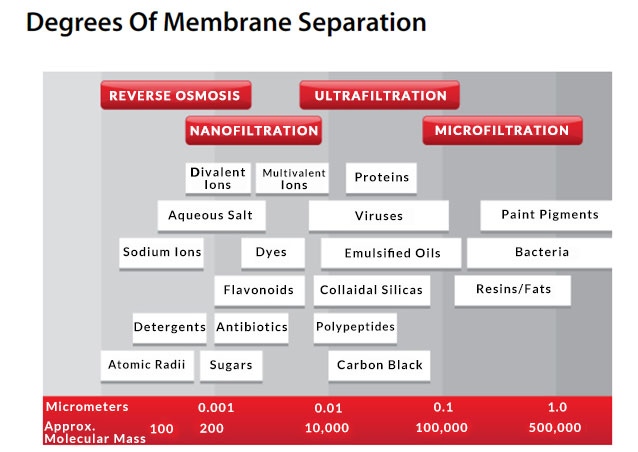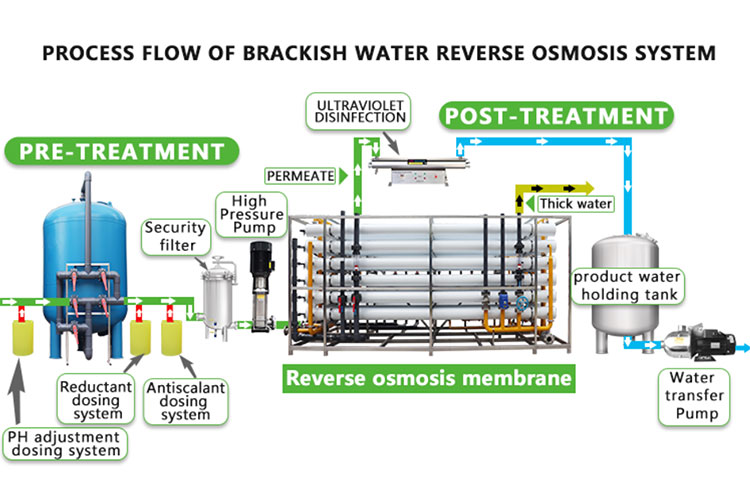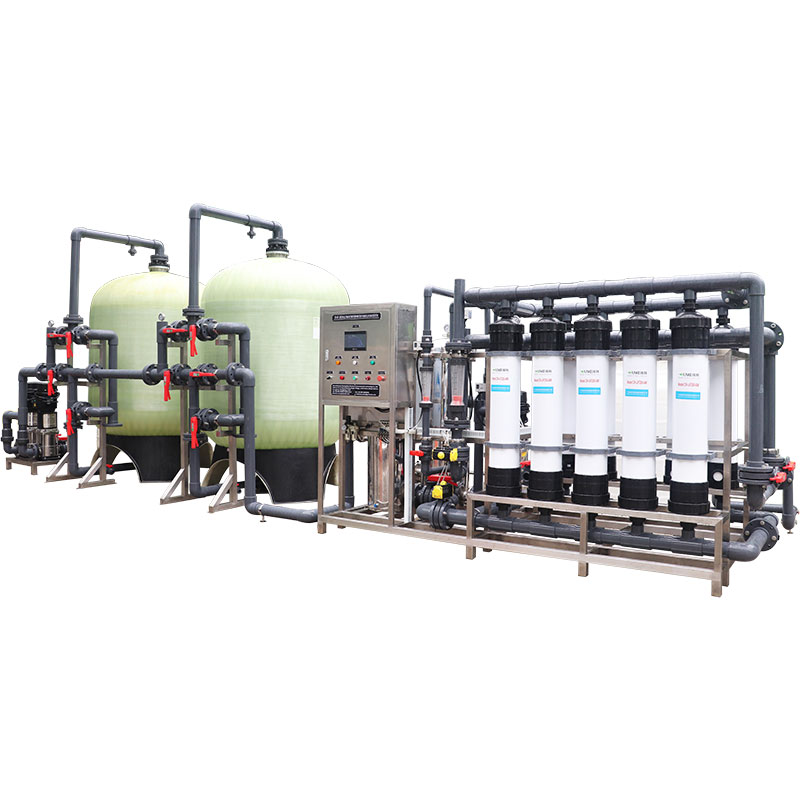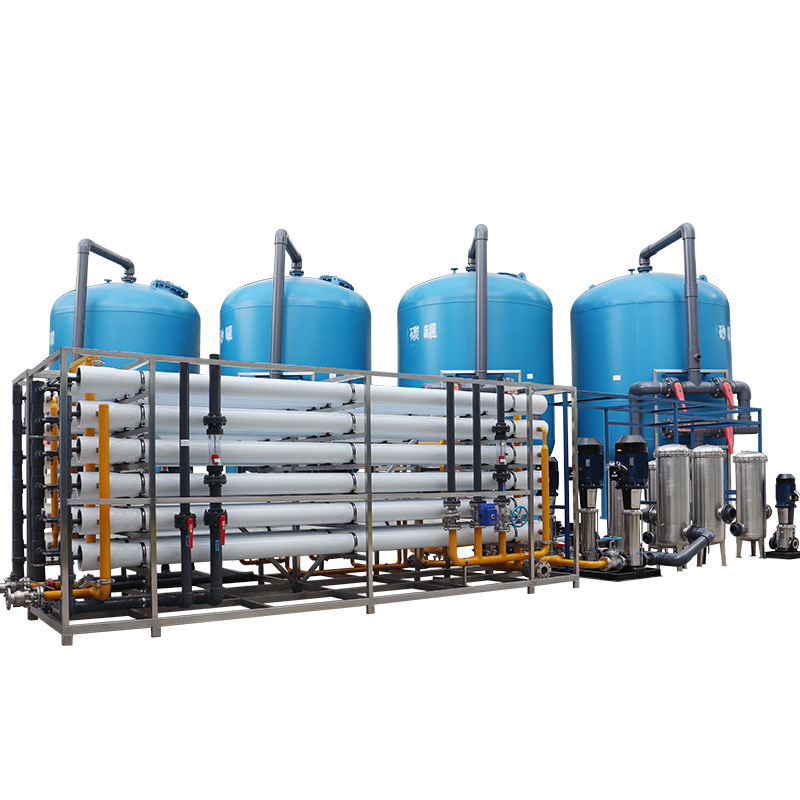Is Ultrafiltration Better Than Reverse Osmosis Systems?
In the field of water treatment, ultrafiltration (UF) and reverse osmosis (RO) systems are two common and important technologies. They each have different working principles and application areas, but which system is better has always been a question of concern to many people.
This article will explore in detail the differences, advantages and disadvantages of ultrafiltration and reverse osmosis systems and their applicability in different applications to help readers understand which system is more suitable for their needs.

How does the ultrafiltration system (UF) work?
Ultrafiltration is a physical filtration process that uses a membrane with a pore size between 0.01 and 0.1 microns to remove suspended particles, bacteria, viruses and most organic matter from water. The pore size of the ultrafiltration membrane determines its filtration capacity, which can effectively remove most contaminants in the water, but cannot remove dissolved minerals and salts.
How does the reverse osmosis system (RO) work?
Reverse osmosis is a membrane separation technology that applies high pressure to pass water molecules through a semi-permeable membrane, while most dissolved salts, organic matter, bacteria and viruses are blocked on the other side of the membrane. The pore size of the reverse osmosis membrane is extremely small (about 0.0001 microns), so it can remove most pollutants in the water, including dissolved salts and minerals.

What are the advantages and disadvantages of the ultrafiltration system?
Advantages of the ultrafiltration system:
1. No electricity required: The ultrafiltration system usually does not require electricity to drive, and can only rely on water pressure to operate, which is suitable for some areas with unstable power supply.
2. Low energy consumption: Since no high-pressure pump is required, the ultrafiltration system has low energy consumption and relatively low operating costs.
3. Easy maintenance: The maintenance of the ultrafiltration system is relatively simple, usually only regular cleaning and replacement of the filter membrane are required.
4. Retain minerals: The ultrafiltration system can retain beneficial minerals in the water, which helps to maintain the nutritional value of the water.
Disadvantages of the ultrafiltration system:
1. Unable to remove soluble salts: The ultrafiltration system cannot remove soluble salts and minerals, and cannot treat hard water or high-salinity water sources.
2. Limited filtration accuracy: Although it can remove most particulate matter and microorganisms, the filtration accuracy of the ultrafiltration system is not as good as the reverse osmosis system.

What are the advantages and disadvantages of the reverse osmosis system?
Advantages of reverse osmosis system:
1. High-purity water: The reverse osmosis system can remove almost all pollutants in the water, including dissolved salts, minerals, organic matter and microorganisms, and the water purity is extremely high.
2. Wide application: Due to its efficient filtration capacity, the reverse osmosis system is widely used in drinking water treatment, industrial water treatment and pharmaceutical water.
3. Improve water quality: The reverse osmosis system can significantly improve the taste and quality of water, and is suitable for occasions with high water quality requirements.
Disadvantages of reverse osmosis system:
1. High energy consumption: The reverse osmosis system requires a high-pressure pump to push water through the membrane, which has high energy consumption and relatively high operating costs.
2. Wastewater generation: The reverse osmosis system will produce a certain amount of wastewater during the filtration process, which is usually 3 to 4 times the water output, resulting in a waste of water resources.
3. Complex maintenance: The maintenance of the reverse osmosis system is relatively complex, and the filter membrane and cleaning system need to be replaced regularly, and the maintenance cost is high.
4. Demineralization: The reverse osmosis system removes all minerals in the water, which may lead to a lack of necessary nutrients in drinking water.

Applicability of UF vs. RO
1. Domestic drinking water: For domestic drinking water, the choice of UF or RO depends on the quality of the water source and personal needs. If the water source is of good quality and only needs to remove suspended particles and microorganisms, UF is a good choice, which can retain beneficial minerals in the water and has low operating costs. However, if the water source contains a high concentration of dissolved salts or pollutants, RO is more suitable and can provide high-purity drinking water.
2. Industrial water: In industrial water treatment, the choice of UF or RO depends on the specific application requirements. For applications that require high-purity water, such as the electronics industry and the pharmaceutical industry, RO is indispensable and can provide high-purity water sources. For some applications that do not require extremely high purity, such as cooling water and washing water, UF is a more economical choice.
3. Agriculture and irrigation: In the fields of agriculture and irrigation, UF is usually a better choice. UF can effectively remove suspended particles and microorganisms in water to ensure water quality, while retaining minerals in water to help crop growth. However, due to its high energy consumption and wastewater generation, reverse osmosis systems are generally not suitable for large-scale agricultural and irrigation purposes.
4. Medical and laboratory: In the medical and laboratory fields, water quality requirements are extremely high, and reverse osmosis systems are usually indispensable. Reverse osmosis systems can provide high-purity water to meet the water needs of medical equipment and laboratory instruments, ensuring the accuracy of experimental results and the safety of medical equipment.
Conclusion on ultrafiltration systems and reverse osmosis systems
Ultrafiltration systems and reverse osmosis systems each have their own advantages and disadvantages and are suitable for different applications. Ultrafiltration systems are suitable for occasions with good water quality, demand for mineral retention, and low operating costs, such as household drinking water and agricultural irrigation. Reverse osmosis systems are suitable for occasions that require high-purity water sources, such as industrial water, medical and laboratory water.
When choosing a water treatment system, you should consider the advantages and disadvantages of ultrafiltration systems and reverse osmosis systems based on the specific water quality and water demand, and choose the most suitable water treatment solution. Through reasonable selection and application, you can ensure water quality safety and meet the water needs of different occasions.
Whether it is an ultrafiltration system or a reverse osmosis system, they play an important role in the field of water treatment. Their respective advantages and disadvantages make them irreplaceable in different applications. Understanding and selecting a suitable water treatment system is crucial to ensuring water safety and improving water quality.




